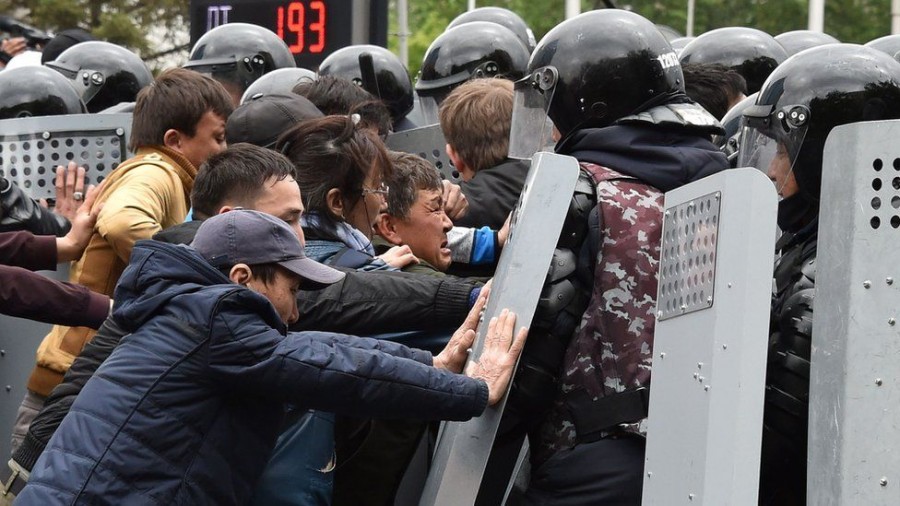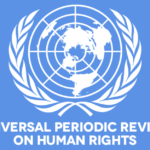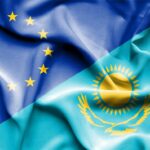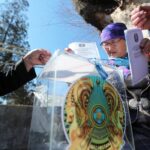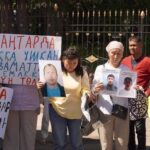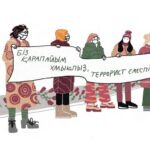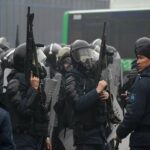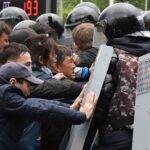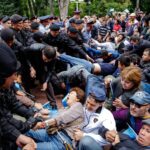This update covers developments on the freedoms of expression, association and peaceful assembly in Kazakhstan from January to June 2019 and was prepared for the CIVICUS Monitor by International Partnership for Human Rights (IPHR) and Kazakhstan International Bureau of Human Rights and Rule of Law (KIBHR) based on KIBHR’s monitoring of the situation in the country.
The most important development in Kazakhstan during the monitoring period was the change of power in the country and related events. On 19th March 2019, President Nursultan Nazarbayev stepped down after almost three decades in power and, in line with the constitutional requirements, appointed senate leader Kassym-Zhomart Tokayev as interim president. Subsequently, Tokayev called for early presidential elections, which took place on 9th June 2019.
According to the official results, Tokayev won with over 70 percent of the vote. However, local and international observers documented serious irregularities on election day and the Organisation for Security and Cooperation in Europe (OSCE) concluded that the election process “was tarnished by clear violations of fundamental freedoms as well as pressure on critical voices”.
Civil society organisations also drew attention to serious violations of the right to freedom of peaceful assembly in connection with the elections. Law enforcement authorities forcefully dispersed peaceful protests held in Almaty, the capital (renamed from Astana to Nur-Sultan at Tokayev’s initiative) and other cities across the country and detained several thousand protesters, as well as journalists and passers-by. There were serious concerns about the conditions in which detainees were held and the legal proceedings in which many of them were convicted. The harsh response of the authorities to the protests (see more details below) cast a shadow on the elections and the beginning of Tokayev’s period in office.
Peaceful Assembly
Harsh response to election protests
As covered before on the CIVICUS Monitor, Kazakhstan’s authorities seriously restrict the right to freedom of peaceful assembly, denying permission to hold protests on different pretexts, dispersing peaceful assemblies and detaining, fining and locking up the participants.
Violations of peaceful assembly reached a new high with the response of the authorities to peaceful protests held in Almaty, Nur-Sultan and other cities in connection with the presidential elections that took place on 9th June 2019. Protesters called for a boycott of the elections, which they considered unfair, and protested against the results. During several days of protests, police and special forces detained several thousand peaceful protesters, often using excessive force as they were rounding up people, dragging and carrying them into buses used to transport detainees to local police stations. Those detained included children, elderly people, as well as a considerable number of passers-by. Police also briefly detained several local and foreign journalists (see more below under “Freedom of expression”) and monitors who were covering and monitoring the protests, including Dmitry Tikhonov from KIBHR and Marius Fossum from the Norwegian Helsinki Committee.
As documented by NGOs, many of those detained were held for 10 hours or more, without access to food and water, and were denied the right to inform their relatives, as well as access to legal assistance. While some of those detained were subsequently released without charge, others were taken to court and warned, fined or sentenced to administrative arrest of up to 15 days for violating Kazakhstan’s restrictive law on assemblies. The trials were quickly conducted behind closed doors, often directly inside police stations, at night and without the presence of lawyers chosen by the defendants.
According to official information, some 4000 people were detained during the protests on 9-13th June. Out of these, 677 people were sentenced to administrative arrests and 305 fined.
Civil society representatives expressed serious concerns about the violations of the rights of the participants in the election protests. KIBHR called on the authorities to establish an independent commission, with civil society participation to analyse and assess the actions of law enforcement authorities during the protests.
The authorities accused the foreign-based opposition movement Democratic Choice of Kazakhstan (known by its Russian abbreviation DVK) of initiating the protests. Led by former banker and prominent opponent Mukhtar Ablyazov, the DVK was banned as “extremist” by a court order in March 2018. On 12th June 2019, the inauguration day of the newly elected president, Almaty was near a lock-down, following a new call for protests from the DVK leader. The city was virtually empty from six in the evening following a widely circulated message warning against staying outside because of expected mass demonstrations. Offices and restaurants closed early and cars left the city centre. No mass protests took place, but police detained over 100 activists and other people, including journalists, near Astana Square and in other places in the city centre.
Only a few days before the presidential elections, youth activists launched the movement Oyan Qazaqstan (“Wake Up, Kazakhstan”) in Almaty to call for free and fair elections and political reforms. This movement took part in monitoring the elections and also held protests in connection with them. The movement’s representatives stated that it does not support the DVK.
Exceptional permission for post-election protests
The response of the authorities to the election protests attracted international attention and drew a lot of criticism. Later the same month, local authorities in Almaty and the capital unexpectedly granted permission for peaceful protests to be held on 30th June 2019, but only in non-centrally located venues that have been specifically designated for holding assemblies. These decisions came after newly elected President Tokyaev stated that people should be allowed to gather and express their opinions in such places. The protest in Almaty was held in support of freedom of peaceful assembly, while the one in Nur-Sultan was devoted to socio-economic issues. Civil society activist Alnur Ilyashev, who was the main organiser of the protest in Almaty, had previously received more than 30 rejections on his applications to hold protests, on various pretexts. The protests took place without interference by law enforcement authorities, although there was a heavy police presence especially in Almaty. Soon after this day, however, the KIBHR documented new violations of the right to freedom of peaceful assembly, including detentions of protesters and the use of excessive force.
Violations of peaceful assembly right during the pre-election period
In the months leading up to the presidential elections, the authorities also often violated the right to freedom of peaceful assembly and detained protesters. Bellow a few examples:
On 1st May 2019, police detained several dozen peaceful protesters in Almaty and other cities. Some of those detained were fined or sentenced to administrative arrests following quick trials. Prior to the protest in Almaty, police also “preventively” detained several civil society activists, using excessive force that left some of the activists bruised and injured. KIBHR is not aware of any investigations into the actions of the police officers involved in these “preventive” detentions.
On 21st April 2019, police detained civil society activists Asya Tulesova and Beibarys Tolymbekov for holding up a banner at the start of the Almaty Marathon, saying: “You cannot run away from the truth”, with the hashtags #ForFairElections and #IHaveAChoice, in a play on words to attract attention to the upcoming presidential elections. Both of them were subsequently sentenced to 15 day’s administrative arrest. Three of their friends, who took photos and filmed the display of the banner, were also detained and later fined the equivalent of 65 USD each. This incident illustrated that the lack of a clear definition of “assembly” in national law allows the authorities to deem any public expression of views a prohibited assembly. In addition to being detained for exercising his right to freedom of assembly, 21-year-old Tolymbekov came under pressure by authorities to carry out his military service, in spite of health concerns. In a joint statement, IPHR and KIBHR called on the Kazakhstani authorities to refrain from unduly restricting the rights of the two activists and to stop intimidating and harassing Beybarys Tolymbekov.
On 22nd March 2019, a group of people gathered for a peaceful protest on the pedestrian Panfilova Street in Almaty, where Nayruz spring holiday celebrations were under way. The participants expressed discontent with the initiative of acting President Tokayev to rename the capital Nur-Sultan in honour of his predecessor, as well as the policies of the authorities more generally. There was a heavy law enforcement presence on the pedestrian street and, as documented by KIBHR police and special force officials quickly apprehended the protesters, as well as passers-by and pushed them into police buses and cars. The Norwegian Helsinki Committee observed how people were detained simply for holding blue balloons, a symbol of the banned DVK movement, which had called on its supporters to gather on Panfilova Street that day. Those detained by police were also questioned about their relationship with the banned DVK movement. They were released after a few hours. Police also detained participants in similar small-scale peaceful protests held in the capital and Shymkent the same day. Journalists covering the protests faced obstruction when carrying out their work (see more below under “Freedom of expression”).
On 27th February 2019, when the ruling party Nur-Otan held its annual conference in the capital, police detained dozens of citizens who had peacefully gathered near the party’s office in Almaty to demand political reforms. Similarly, peaceful protesters were detained in Astana (at that time, not yet renamed) and other cities. Amnesty International decried police abused in connection with the detentions. In addition to protest participants, police also detained passers-by and other non-participants, including KIBHR staff member Dmitry Tikhonov who was present to monitor the event in Almaty. Tikhonov and others detained reported being questioned about their association with the banned opposition DVK movement. In the morning of 27th February, the police visited a number of civil society activists in Almaty and the capital, warning them not to take part in the planned assemblies and summoned others for questioning at the time of the gatherings. In Uralsk, police detained three civil society activists prior to the gathering in that city and kept the home of a fourth activist under surveillance.
On 20th February 2019, Almaty mayor Bauyrzhan Baybek held a public meeting with residents. The evening before the event, police visited civil society activists Dilnar Isenova and Sakhib Zhanabaeva in their homes, demanding that they do not show up at the mayor’s meeting. Two other activists – Andrey Buzykin and Alisa Buzykina – connected with the ecological movement Kok-Zhailau – were detained on their way to the meeting, while activist Yuri Malenkiy was detained during the meeting as he sitting and preparing his questions to the mayor. The head of the Liberty foundation, Galym Ageleuov, who reported about the detentions, noted that the authorities typically attempt to ensure that “inconvenient” citizens do not get to pose questions to state officials during events such as the one on 20th February.
Kazkakh Courts reject Feminist NGO’s Registration https://t.co/jWysa4i6SU #Feminism #Kazakhstan pic.twitter.com/LefBLPI7UF
— Fort Russ News (@FortRussNews) June 6, 2019
Association
Organisation defending lesbian, bisexual and queer women’s rights denied registration
Feminita, a lesbian, bisexual and queer women’s initiative, has repeatedly applied for registration as a legal entity with the Ministry of Justice since its foundation in December 2017. However, each time, the Ministry of Justice returned the application with a request to amend the statute of the organisation and bring it into line with the Law on Non-commercial Organisations, without specifying what changes were needed. The third time this happened, the founders of Feminita filed a lawsuit against the Ministry of Justice, arguing that the Ministry’s actions violated their right to freedom of association and was discriminatory. In a decision published on 31st May 2019, the Medeusky District Court in Almaty issued a decision concluding that the objectives of Feminita do not provide for strengthening “spiritual and moral values” and “the role of the family” in society. Thus, the organisation was effectively denied registration.
Harassment of group standing up for the rights of ethnic Kazakhs in China
Atajurt, a group founded in 2017 to defend the rights of ethnic Kazakhs and other ethnic minorities in China’s Xinjiang province experienced a similar incident as the one described above. Atajurt has repeatedly applied for registration with Kazakhstan’s Ministry of Justice but has had its application returned each time with the argument that its statute do not correspond to the requirements of national law. The organisation’s representatives believe that the government has failed to grant it registration out of fear of upsetting the Chinese government.
The leader of Atajurt, Serikzhan Bilash has also come under pressure. He has been the target of smear campaigns in state-controlled media and in February 2019, an Almaty court fined him an equivalent of 670 USD for leading an unregistered organisation. Moreover, on 10th March 2019, police detained Bilash in Almaty and forcibly took him to the capital, where he was placed under house arrest on charges of “inciting national discord” (under Criminal Code article 174), a vaguely worded provision that has often been used against critical voices. During the first few hours of his arrest, he was denied access to his lawyer. He and his lawyer have also reported that he has been subjected to pressure during the investigation. If found guilty, he could face up to ten years in prison. At the end of June 2019, Bilash remained under house arrest pending trial. When extending his arrest, the court rejected a request by his lawyer to transfer him back to Almaty, his home city where his family lives, or to release him on bail. Bilash and his colleagues consider the charges against him politically motivated. In a joint statement, KIBHR and the Norwegian Helsinki Committee called for his release, saying that his arrest “appears to be a bid to silence one of the most prominent voices speaking out on rights violations in China’s Xinjiang province”.
Prominent human rights lawyer Aiman Umarova, who represents Serikzhan Bilash and the Atajurt group, has also recently been subjected to acts of intimidation because of her work on cases related to the crackdown on ethnic Kazakhs in China’s Xinjiang province. In a joint statement issued in June 2019, IPHR, KIBHR and the Norwegian Helsinki Committee decried the harassment of Umarova and called on the Kazakhstani authorities to “do more to ensure a safe and free working environment for human rights lawyers”.
Pressure on activists monitoring elections
Following the presidential elections, law enforcement authorities and security services put pressure on independent monitors, who documented and drew attention to irregularities and violations tainting the elections. Almaty-based monitor, Serik Abishev reported that three security service officials arbitrarily detained him on 19th June 2019 and held him for several hours, intimidating him and demanding that he withdraw his complaints about electoral violations. According to Abishev, the officials warned him that “an accident may happen to him at any time”. After the incident gained publicity, the security services told Abishev that they had opened a criminal investigation into it. KIBHR called on the authorities to stop pressuring independent monitors.
Expression
Disruption of internet during election protests
Over the days of the election related protests in June 2019, the authorities periodically blocked access to social media and messenger applications such as WhatsApp. The mobile internet in the centre of Almaty was also periodically shut off.
On 12th June 2019, KIBHR team members who were monitoring protests in Almaty experienced interruptions in their mobile phone connections in what appeared to be a deliberate attempt to obstruct their monitoring activities.
Obstruction of the work of journalists covering protests
In several cases during the reporting period, law enforcement authorities detained and otherwise obstructed the work of journalists covering peaceful protests. During the election protests in June (see more above), both local and foreign journalists were rounded up along with protesters. Chris Rickleton from France Press tweeted that his accreditation was taken from him and that he sustained a black eye during a violent arrest, when he fell on a police officer’s knee. Journalists from Radio Free Europe/Radio Liberty (RFE/RL), Vlast.kz and Hola News were also among those detained. They were all released after a few hours.
On 22nd March 2019, police detained correspondent Svetlana Glushkova from Currenttime TV (part of RFE/RL) near the Shapagat shopping centre in the capital, where citizens dissatisfied with the renaming of Astana had gathered. A 14-year-old student allegedly filed a complaint that Glushkova had pushed and injured her. Glushkova was released after about five hours. However, later an administrative case was opened against her in connection with the alleged incident and she was fined 17.000 Tenge (around 47 USD).
On 22nd March 2019, young men claiming to be students also obstructed the work of other journalists covering the protest in Astana, as well as a similar one in Almaty (see more about this protest above), attempting to prevent them from documenting the detentions. Police officers present failed to intervene in support of the journalists.
In another case, police detained RFE/RL reporter Orken Zhoyamerken and camera operator Yerzhan Amirkhanova at a demonstration near the government seat in the capital on 9th January 2019. The police later stated that the detention had been “a mistake”. According to Zhoyamerken, the police demanded that they delete footage from the protest.
Police detained RFE/RL journalist Sania Toyken twice when she was in the city of Zhanaozen to cover the protests of unemployed people, who demanded that local authorities help them find work. On 27th February 2019, police detained her and video operator Sanat Nurbek, holding and questioning them for six hours because of an alleged complaint from a local resident. Late on 11th March 2019, police detained Toyken outside a local café, supposedly as a witness to an argument between visitors of the café. According to Toyken, she told the police officers that she did not see the argument and did not know what had happened, but they still insisted that she go with them to the police station. The journalist was released after a few hours but later a local court fined her around 137 USD for “disobeying the lawful order or request of a police officer”.
Attempts to silence mothers’ protest initiative
On 4th February 2019, five children burned to death in an Astana house fire while their parents were working night shifts. The tragic event caused an outrage among the public and sparked protests by mothers with many children, who demanded an increase in assistance to large families. Several protests were subsequently held to this end in the capital and other cities. Some of the mothers involved in protests complained about being subjected to pressure by the authorities. In addition, on 12th February 2019, police detained RFE/RL reporter Saniya Toiken as she was conducting interviews with mothers who had reported facing pressure in Astana. The journalist was held for about half an hour before being released. In June 2019, Almaty-based civil society activists Saule Abildahankyzy and Irina Kim, both of whom have publicly supported the mothers’ protest initiative, reported being summoned for questioning by police. When Abildahankyzy was leaving the police station on 5th June, several unknown women attacked and physically assaulted her as a result of which she had to be taken to hospital for a check-up.
In June 2019, police also opened a criminal investigation against three mothers involved in protests. The three women are facing charges of participating in the activities of a banned organisation (Criminal Code article 405), namely the foreign-based DVK opposition movement. In early July 2019, they were all placed in pre-trial detention for two months by court order. The NGO Working Group for the Protection of Children criticised this decision as excessively harsh and unfounded since the three women have no previous criminal record, all have underage children and are suspected of a less serious crime for which the Criminal Procedure Code does not provide for detention as a pre-trial measure of restraint.
New criminal convictions for defamation
Defamation remains criminalised in Kazakhstan. During the reporting period, new defamation convictions were handed down against a journalist and a civil society activist.
The Adil Soz Foundation for Free Speech reported that Petropavlovsk City Court found Elena Kuznetsova, editor-in-chief of the Petropavlovsk-based newspaper “Kvartal”, guilty of defamation (Criminal Code article 130) on 16th March 2019 and sentenced her to a year of restricted freedom with court-imposed control and restrictions. The charges against her related to three publications from November 2018 concerning Russian business interests and conflicts in Kazakhstan and were initiated following a complaint filed by Russian entrepreneur German Mazur and his partner Olesya Datsko. However, on 18th June 2019, North Kazakhstan Regional Court repealed Kuznetsova’s conviction on appeal, acquitting her of the charges. The judges at the court concluded that there was insufficient evidence for the charges against her and held that the lower-level court had failed to ensure a comprehensive, full and objective consideration of the case.
In the second case, on 29th March 2019, Baikonur City Court convicted civil society activist Marat Dauletbayev of defamation (similarly under Criminal Code article 130) because of his criticism of the actions of Baikonur’s mayor. The court sentenced him to one year of restricted freedom and 100 hours of community service and ordered him to pay 100 000 Tenge (around 240 USD) in compensation of moral damages to the mayor. The case against the activist was opened based on a complaint from the mayor. While finding Dauletbayev guilty, the judge noted that the some of the accusations Dauletbayev had leveled against the mayor had been “partially confirmed”. This was the second defamation conviction handed to Dauletbayev for speaking out against the actions of Baikonur’s mayor: in 2017, he was given a one-year prison sentence because of Facebook posts that accused the previous mayor of corruption in the allocation of land plots. However, he did not have to serve that sentence as he was released under an amnesty announced in connection with Kazakhstan’s 25-year-independence anniversary. Baikonur, which hosts a well-known cosmodrome, is rented by the Russian Federation under an agreement with Kazakhstan and the city mayor is appointed by the presidents of Russia and Kazakhstan.
Trade union leader facing prison sentence
In April 2019, trade union leader Erlan Baltabay appeared in court in the city of Shymkent on charges of misappropriating or embezzling union funds (under Criminal Code article 189). The criminal case against him was opened in September 2018 based on a complaint from a member of a local group of the independent trade union “Worthy Labour”, which he heads. The funds in question have been in Baltabay’s possession since “Worthy Labour” was forced to suspend its activities under the restrictive 2014 Law on Trade Unions, under which many trade unions have been unable to re-register. However, he has not spent the funds. Baltabay considers the charges to be without basis and has argued that they should be dropped. At a hearing on 25th June 2019, the prosecutor requested an eight-year prison sentence and a lifetime ban on involvement in trade union activities for Baltabay.
Erlan Baltabay is not the first trade union leader in Kazakhstan to have been prosecuted on charges believed to constitute retaliation for labour rights activities. Trade union leaders Nurbek Kushakbayev and Amin Yeleusinov were both imprisoned in 2017 following a peaceful workers’ protest against the court-sanctioned closure of the country’s largest independent trade union. They were released on parole in May 2018. Larisa Kharkova, leader of the independent trade union against whose closure Kushakbayev and Yeleusinov protested, was sentenced to four years of court-imposed restrictions on her freedom of movement and other rights in July 2017.
In June 2019, at the annual conference of the International Labour Organisation (ILO) in Geneva, Kazakhstan again came under criticism for its violations of labour and trade union rights, including the persecution of independent trade union leaders and the denial of the right to association to independent unions. The Committee concluded that Kazakhstan had failed to make any progress on implementing ILO Convention No 87 on freedom of association and protection of the right to organise. To emphasise its concerns, the Committee decided to include its conclusions and recommendations on Kazakhstan in a special paragraph of its outcome report. Kazakhstan was requested to report back about the steps taken to address these issues by 1st September 2019.


